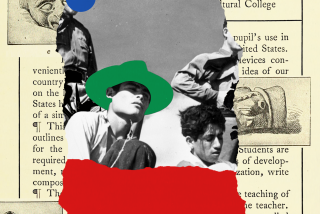Japan: the Good in the Bad Past
- Share via
The past, though it may be dead, is seldom allowed to rest undisturbed. History is constantly being reinterpreted, sometimes to the improvement of understanding, sometimes--as political fashions change--to support a cause. Every country of course seeks to portray its past in the best possible light, as a means to inspire patriotism and to encourage national self-esteem. Japan is no different from other nations in this respect, but Japan is different to the extent that some of its efforts have invited major international controversy.
Four years ago Japan shocked its East Asian neighbors when its Education Ministry approved a rewriting of history textbooks to dilute what until then had been largely straightforward accounts of certain events that preceded and took place during World War II. In the revised versions Japan did not commit “aggression” against China, it only “advanced” into China. An atrocity as infamous and as well-documented as the rape of Nanking was depicted as a matter of “confusion” and attributed to Chinese provocations. The brutal 40-year occupation of Korea and Japanese attempts to eradicate Korean culture were glossed over. These changes brought official protests from the governments of China and South Korea.
Now a fresh controversy has arisen, prompted in part by a new textbook that again avoids the use of the word “aggression” in regard to Japan’s policies and behavior, and in part by the outspoken remarks of education minister Masayuki Fujio, who has since been sacked by Prime Minister Yasuhiro Nakasone for comments that were taken as insulting by South Korea and China. The new text has been approved by the Education Ministry, a necessary step for its use in the schools. How widely used it will be remains to be seen.
The oddity of Japanese history texts, as Sam Jameson reported in The Times the other day, is that most are written by authors with a Marxist orientation and then approved for use by the Education Ministry of conservative governments. The Marxist view interprets 20th-Century Japanese expansionism as the imperialist stage of capitalist development. The Education Ministry on its part has sometimes tried to soften depictions of the aggression and brutality that accompanied Japan’s moves into other Asian countries. In 1982, when South Korea and China protested such revisions, Nakasone ordered some toughening of the textbook language.
No country, of course, writes its history texts to suit the views of other countries. The accounts given in texts used in American schools of this country’s wars with England, Mexico and Spain, for example, obviously differ from the interpretations in those countries of the same events. Is it a special cause for concern, then, when Japan’s texts tend to avoid candor on certain incidents in the recent past? On two counts it is:
First, memories in Asia of imperial Japanese policy remain vivid and painful, and even an appearance of insensitivity to these memories evokes a sense of hurt and suspicion that does not help Japan internationally.
Second, no country ultimately suffered more because of the Asian war prompted by Japanese aggression than did Japan itself, as Japanese who lived through that period are quick to recall. It would be a terrible disservice to the youth of Japan if the causes, events and consequences of that war are allowed to be taught in ways that distort or obscure the reality.
Every nation has things in its past that it would prefer not to remember. Very often those are the very things that no nation for its own good can afford to forget.
More to Read
Sign up for Essential California
The most important California stories and recommendations in your inbox every morning.
You may occasionally receive promotional content from the Los Angeles Times.












